Ending homelessness begins with restructuring the Asheville, Buncombe system, says report
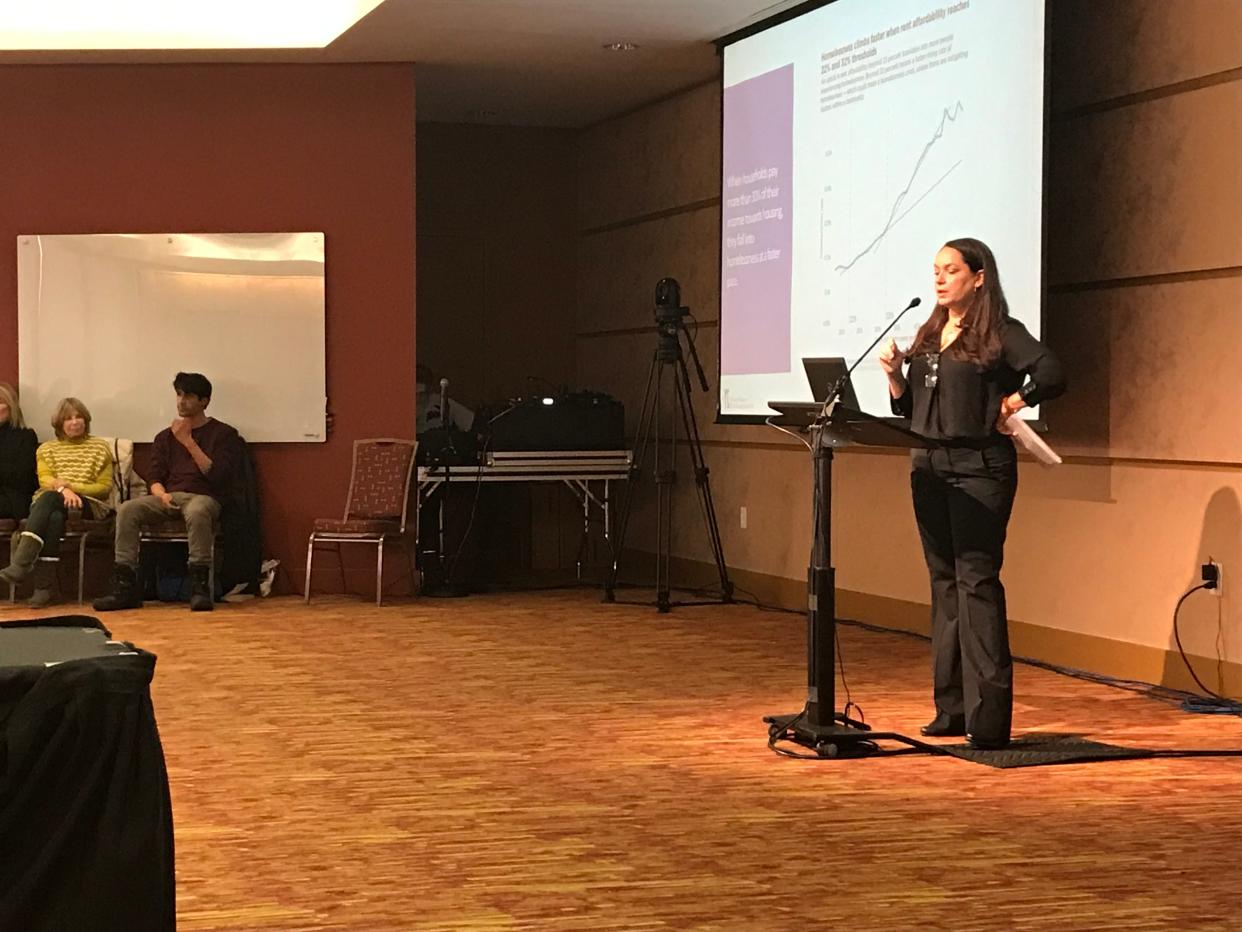
ASHEVILLE - In the overflowing banquet hall of the Harrah's Cherokee Center, the results of a $73,000 study painted a vision of success: that by the January 2025 point in time count, Buncombe County would find its unsheltered homelessness number cut in half.
But in order to get there, consultants said, the city must be willing to follow a number of recommendations, changes that would begin with the system structure itself.
“(I’ve) never seen another CoC situated like this, that appoints only from the city and the county,” said Josh Johnson, senior technical assistance specialist with the National Alliance to End Homelessness. “It’s not the usual way CoCs are structured.”
Previous coverage:Report: How will Asheville end homelessness? See the recommendations from a $73K study
More:Who will sit on Asheville's water outage independent review committee? Here's the vote
He's referring to Asheville and Buncombe County's Continuum of Care, a federal framework that establishes a local planning body responsible for coordinating a system of housing and services for people experiencing homelessness.
Results of a new 54-page report were presented Jan. 25 by the Washington, D.C.-based National Alliance to End Homelessness, a nonprofit, nonpartisan national leader in the field, at a joint meeting of Asheville City Council and the Buncombe County Board of Commissioners.
The first major change that must happen, according to Johnson and Alliance CEO Ann Oliva, is to move the appointment structure for the CoC's leadership board away from just the city and county, and ensure the board is not situated under either governmental entity.
“To ensure that ... it is truly governed by the CoC," Johnsons said in explanation. "I think there’s a little bit of cloudiness about where do those decisions get made.”
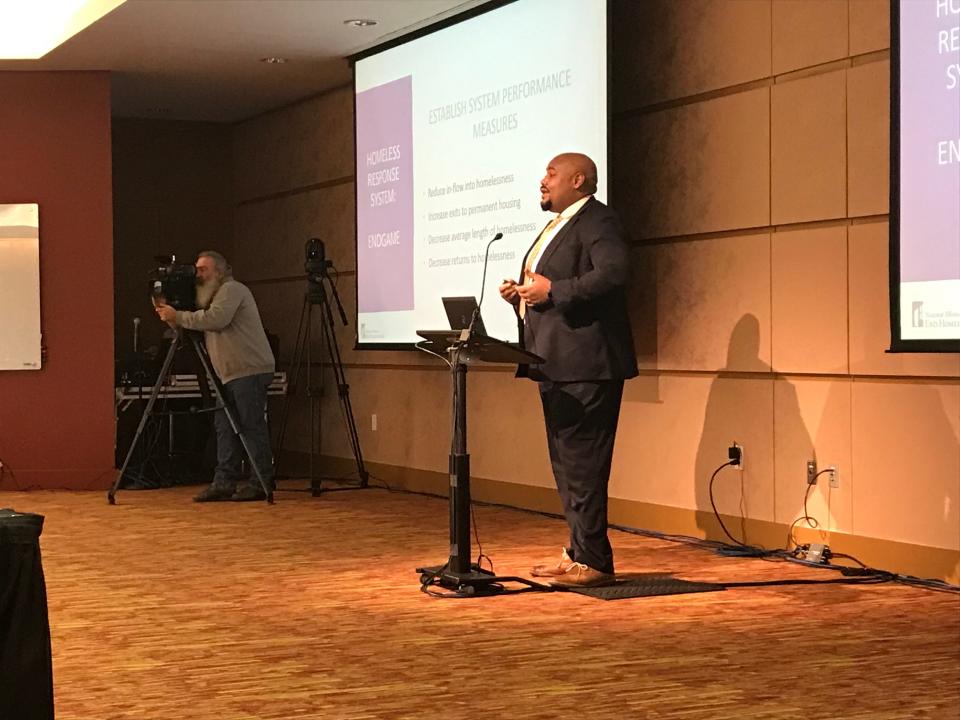
Currently, the CoC's governing body, which makes system-level decisions and sets strategies, policies and funding priorities, is run by the Homeless Initiative Advisory Committee, with eight seats appointed by City Council and eight seats appointed by county commissioners.
The city acts as the lead agency for the CoC.
Council member Kim Roney asked what the consequence would be if they could not find a way to create a collaborative structure outside of the city and county, "are we going to meet our goal?"
More:NC ACLU petitions for release of bodycam footage in arrest of Asheville reporters
More:5 felony littering cases will go to trial in Asheville; defendants express 'dismay'
“If I’m being completely honest, it would be really hard to meet the goal if you don’t have the structure in place to do that collaboration, if you’re not working together in a different way than you currently are," Oliva said.
“Your community has told us, in many different ways, that they would like to see action in this area. That the status quo is not working.”
In one of the few applause lines of the afternoon, Asheville City Council's newest member, Maggie Ullman, said, "I think we know what we’ll see if we don’t do anything more or different. It will get worse. And more people will be hurt.”
'Your system is stuck'
It's no secret that Asheville is entrenched in a housing crisis, and when people fall into homelessness, "folks can't get out," said Oliva.
"There is not enough affordable housing ... for them to exit the system, so your system is stuck."
Incomes in the community are low, Oliva said, and as rents increase and household incomes don't change, "the gap is getting wider and wider in your community."
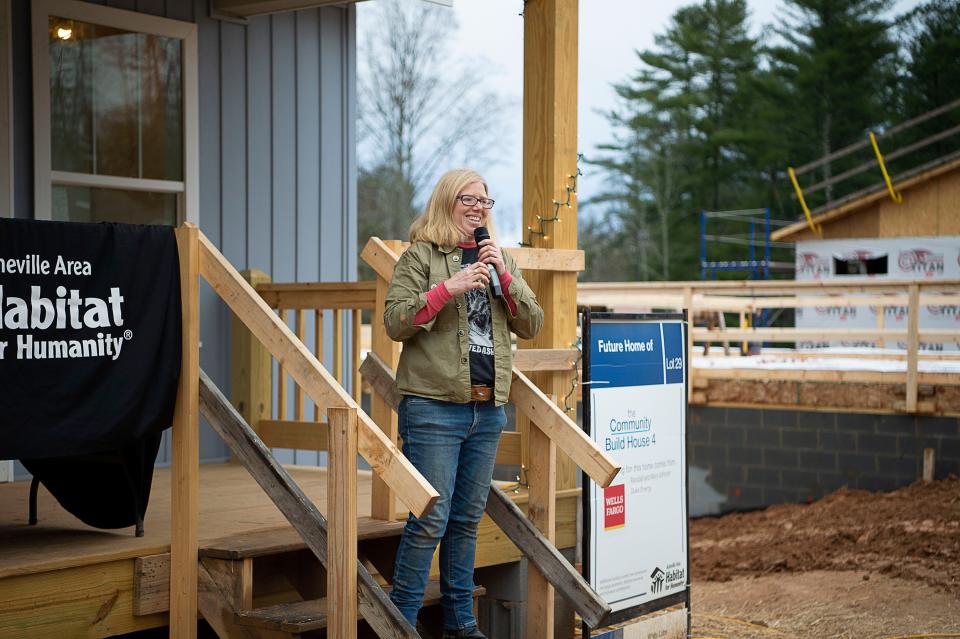
More:ACLU of NC challenges Asheville's park bans against felony littering defendants
More:For renters, Asheville area market the worst in NC, 5th worst in the US, study says
This crisis, compounded by the impacts of the pandemic, have contributed to significant increases in chronic and unsheltered homelessness.
The number of people experiencing homelessness is up 21% since 2021 to 637, with twice as many people who are unsheltered than the year before.
But despite being a community in crisis, Oliva and Johnson both said they thought Asheville and Buncombe County were capable of meeting the goal of reducing unsheltered homelessness in Asheville by 50% in the next two years.
"I think that the number of people that showed up today is indicative of the energy that’s around this," Oliva told the Citizen Times, referring to the overflow crowd. "The energy of the people that we’ve worked with, the providers, they want something different. And they want to make that kind of progress. So I think it is achievable, for sure.”
The report contains 30 multiprong recommendations, of which they pulled out eight short-term priorities that Oliva said would likely have the biggest impacts.
Aside from improving system governance, which sat at the top of the list, the priorities included increased emergency shelter capacity, as well as rapid rehousing slots, which provide rental assistance for up to 24 months and services designed to quickly rehouse and stabilize individuals and families.
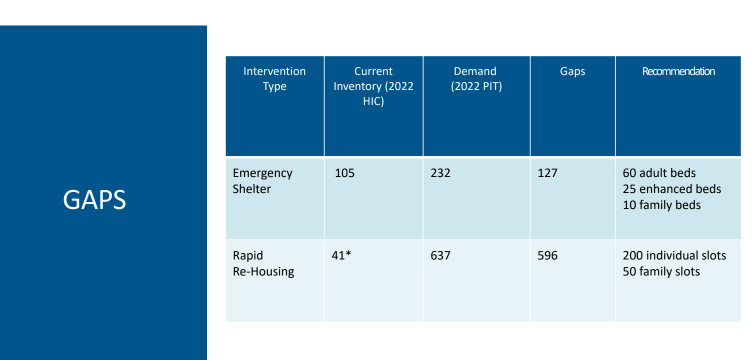
More:Asheville developer to renovate Montford church in historic district into 6 condos
According to the report, which the study notes multiple times is working off of limited data, there are only 105 year-round beds available for single, non-veteran adults. With 232 people found to be experiencing unsheltered homelessness in the January 2022 point-in-time count, that creates a gap of 127 beds.
“That very simple math tells us that we need additional resources in these two categories," Oliva said.
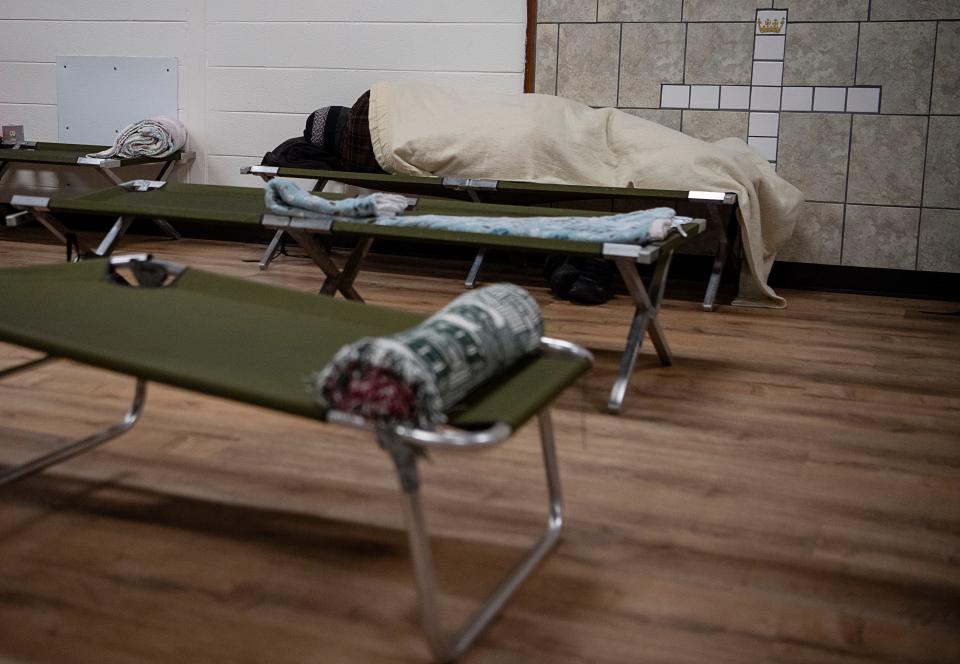
How many new beds are needed?
The Alliance recommendation calls for 95 new beds — 60 beds for single adults in immediate and low-barrier shelter; 25 beds of enhanced shelter with mental health and substance use specialists onsite; and 10 beds serving families with children.
Oliva said they are not suggesting the CoC fills the gap with a one-to-one number of beds, as the hope is people will move through the system, and find more permanent housing solutions.
It also calls for 250 slots of rapid rehousing. The current inventory, taken from the 2022 housing inventory count, which is likely outdated, sits at 41 slots.
Johnson told the Citizen Times that the goal is for the beds to turn over every 150 days, to create a "consistent flow." He said they also recommend the investments be non-congregate or of very small congregate, that way the resources can be reinvested once more people are housed.
“That’s why we’re not saying, ‘build a monumental congregate shelter,’ as a solution to this situation, because the numbers are within reach," Johnson said.
The city's 2023 point-in-time count, which offers a single night snapshot of homelessness in Asheville and Buncombe County, will take place Jan. 31.
More:How many people are homeless in Asheville? 2023 point-in-time count gets underway soon
New encampment policy needed
Another item Oliva pulled out as "one to work on quickly" was developing and implementing an encampment resolution policy. Currently, the city and county do not have a specific set of policies, she said, aside from a policy held by the Asheville Police Department.
"In the places that are doing encampment resolutions policies, there are usually multidisciplinary teams that don't include the police unless there is actually some criminal activity that's happening," Oliva said. "And those multidisciplinary teams are professional outreach workers that can provide trauma informed care to people who are living in unsheltered situations and they have access to housing and shelter resources."
Mayor Esther Manheimer clarified that in moving through the key priorities, they would have the "reconstituted CoC, and that CoC would be making recommendations around encampment policy and the other items we're about talk about."
Oliva said that was "exactly right."
"In order to get to the priorities two through (eight) ... you actually have to do No. 1. No. 1 is to create the governance structure, strengthen your Continuum of Care, really have the right players at the table in your Continuum of Care that are making the recommendations and doing the work," she said.
The other key priorities include:
Build the capacity of street outreach to ensure a multidisciplinary and coordinated approach to meet the needs of people experiencing homelessness.
A hotline or website for community members to share locations for follow-up outreach or for self-referrals.
Begin the implementation of system improvements to the Coordinated Entry System.
Create a Coordinated Entry system Policy Committee of the CoC to develop or revise written standards, policies and procedures.
Create a high-utilizer targeted initiative.
Develop and implement a housing-focused pilot program to rehouse up to 20 high-utilizers of multiple systems of care and long-term shelter users.
Promote a housing surge for unsheltered people experiencing chronic homelessness using a 100-Day Challenge model.
Identify landlords to participate.
Implement Moving On strategies for long-term supportive housing residents (as appropriate).
Identify landlords to participate
What comes next?
To close out the meeting, Emily Ball, the city’s homeless strategy division manager, offered a look at Asheville and Buncombe County’s next steps.
Most immediately, the Homeless Initiative Advisory Committee will hold a retreat 9 a.m. to 3 p.m. Jan. 26 at the Harrah’s Cherokee Center to further “unpack recommendations.”

More:Answer Woman: Can Asheville's water system support all its new development?
From there, they will develop a transition plan to build out its CoC structure and evaluate and pursue action plans to implement recommendations.
As the system lead, the city’s staff, specifically those in the Homeless Strategy Division, led by Ball, will work with the committee to do this work, which will likely include specific requests of the city and county.
On Feb. 13, the city, county and committee leadership will visit emergency shelters in Raleigh/Chapel Hill, and city and county staff will participate in a CoC-led work group to develop an encampment resolution strategy.
Sarah Honosky is the city government reporter for the Asheville Citizen Times, part of the USA TODAY Network. News Tips? Email shonosky@citizentimes.com or message on Twitter at @slhonosky.
This article originally appeared on Asheville Citizen Times: Asheville, Buncombe receive long-awaited homelessness report

